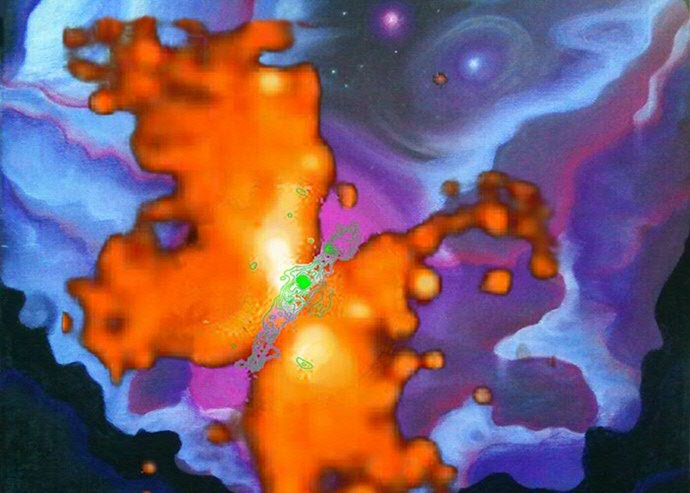Astronomen zien raadselachtig stikstofgebied in vlindervormige stervormingsschijf

Een internationaal team van sterrenkundigen, met Nederlanders in de hoofdrol, heeft in het zuidoosten van een vlindervormige stervormingsschijf een gebied ontdekt met veel stikstofhoudende moleculen. In het noordwesten van de schijf is er juist weinig stikstof. De astronomen vermoeden dat meerdere sterren-in-wording dezelfde stervormingsschijf delen, maar wat er precies aan de hand is, is nog een raadsel. Het artikel is geaccepteerd voor publicatie in het vakblad Astronomy & Astrophysics. Eerste en tweede auteur zijn respectievelijk RUG- en SRON-onderzoekers Veronica Allen en Floris van der Tak.
Een internationaal team van sterrenkundigen bestudeerde het stervormingsgebied G35.20-0.74N op ruim 7000 lichtjaar van ons vandaan aan de zuidelijke sterrenhemel. De sterrenkundigen gebruikten hiervoor de (sub)millimetertelescoop ALMA op de Chileense Chajnantor-hoogvlakte die de moleculaire gaswolken in kaart kan brengen waarin sterren ontstaan.
Iets bijzonders
De onderzoekers zagen in het stervormingsgebied iets bijzonders in de schijf rond een jonge, zware ster. Terwijl er overal in de schijf grote zuurstofhoudende en zwavelhoudende koolwaterstoffen aanwezig waren, vonden de astronomen alleen in het zuidoostelijke gedeelte van de schijf grote stikstofhoudende moleculen. Daarnaast bleek het aan de stikstofkant ook nog eens 150 graden warmer dan aan de andere kant van de schijf.
Mede op basis van deze waarnemingen vermoeden de wetenschappers dat er zich tegelijkertijd meerdere sterren in die ene schijf aan het vormen zijn. Daarbij zijn sommige sterren heter of zwaarder dan andere. De onderzoekers verwachten dat de schijf uiteindelijk zal opbreken in meerdere kleine schijven als de sterren verder groeien.
'We hebben waarschijnlijk geluk gehad'
Er zijn overigens wel vaker chemische verschillen in één stervormingsgebied gezien, bijvoorbeeld in het sterrenbeeld Orion. Eerste auteur Veronica Allen (Rijksuniversiteit Groningen en SRON): "Maar dat gebied is vijf keer zo groot als het door ons onderzochte gebied. Wij hebben waarschijnlijk geluk gehad, want zo'n chemisch verschil is waarschijnlijk van korte duur."
Tweede auteur Floris van der Tak (Rijksuniversiteit Groningen en SRON): "Veel van de stikstofmoleculen zijn giftige cyaniden. Daarover weten we verder nog weinig, omdat het hiermee op aarde in laboratoria gevaarlijk werken is."
De astronomen onderwerpen de stervormingswolk inmiddels aan een gedetailleerder onderzoek. Allen: "Misschien kunnen we de schijf wel live zien opbreken in kleinere schijven." Daarnaast stellen de sterrenkundigen modellen op om te kijken hoe verschillen in leeftijd, massa, temperatuur of gasdichtheid ook een verschil in chemische samenstelling kunnen veroorzaken.
Veronica Allen
Veronica Allen (Verenigde Staten, 1986) reisde in 2004 naar Engeland voor een studie aan de University of Manchester. Ze moest echter na een jaar stoppen vanwege het hoge collegegeld voor niet-EU-studenten. In 2009 kon ze tegen EU-tarief haar studie vervolgen omdat ze vijf jaar in Engeland gewerkt had. Vervolgens behaalde ze in 2013 haar masterdiploma in de astrofysica aan de University of Leeds. Sinds 2014 is ze PhD-student aan het Kapteyn Instituut van de Rijksuniversiteit Groningen en SRON.
Artikel
'Chemical Segregation in Hot Cores With Disk Candidates: An investigation with ALMA'
V. Allen, F.F.S. van der Tak, Á. Sánchez-Monge, R. Cesaroni, M.T. Beltrán. Geaccepteerd voor publicatie in Astronomy & Astrophysics. (gratis preprint)
Bron: nieuwsbericht NOVA
Meer nieuws
-
17 februari 2026
De lange zoektocht naar nieuwe fysica
-
10 februari 2026
Waarom slechts een klein aantal planeten geschikt is voor leven
